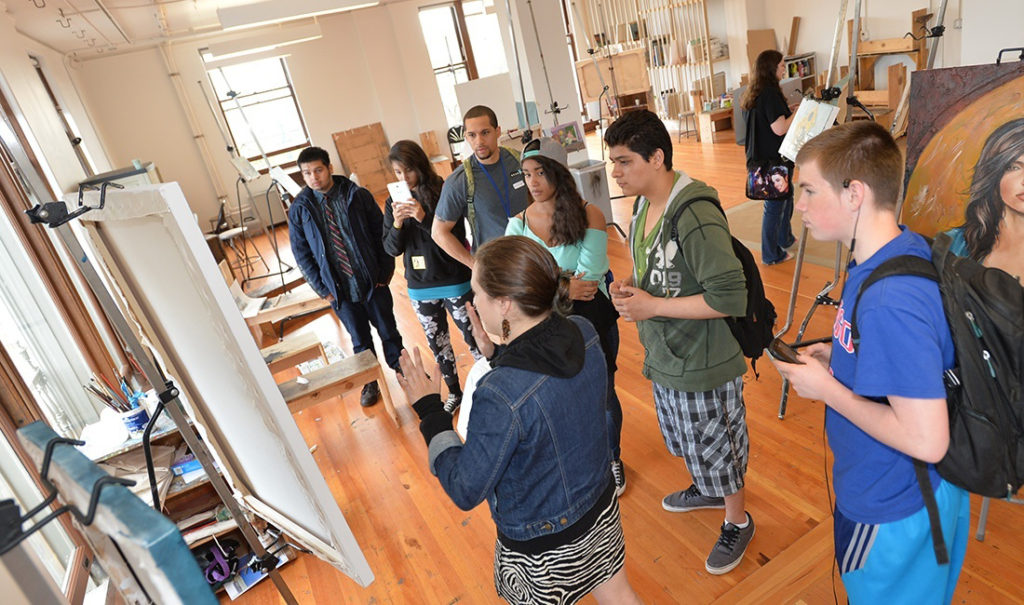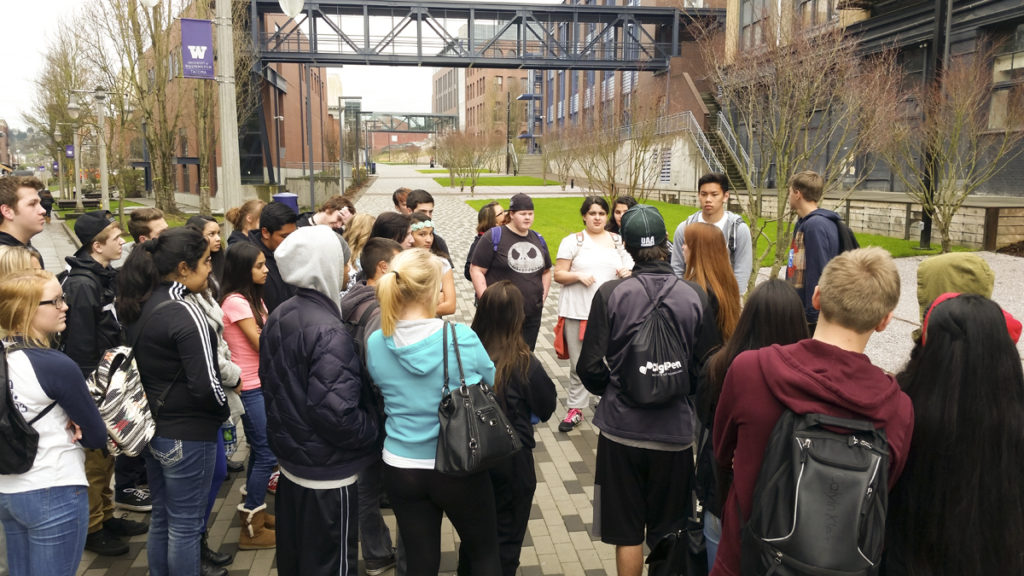VANCOUVER — What happens after high school graduation? For some students, the answer isn’t as clear-cut as “go to college” or “get a job.”
For many students, the answer might include a career that requires post-secondary education, but not necessarily from a traditional four-year university or college.
“College is a big commitment and we’re seeing more and more people coming out of a four-year college who can’t find work,” says Lori Johnson, dean of admissions for the East West College of the Healing Arts school in Portland. “But there are a lot of trade opportunities.”
Becoming a massage therapist — a job with an average salary of $53,000 in the Vancouver/Portland metro region — and studying at the East West College is just one such option.

Nina Stemm, who coordinates the Vancouver Public Schools district’s GEAR UP program, which helps students and their families prepare for life after high school, says her program wants to get families and students talking about postsecondary education — whether that’s a two-year college, four-year university, a technical college or a trade school — way before they ever enter high school.
“Studies are showing that the sooner we start having these conversations with students and start giving them that language of ‘these are the expectations of what you do after high school,’ the sooner they start seeing the end of high school as, not the end of the road, but as the beginning of another road,” Stemm says.

Although the GEAR UP program already goes into schools throughout the district to help prepare students for what happens after they receive their high school diploma, Stemm says she wanted to see a big event where students of all ages could come and meet with representatives from a variety of colleges, universities, trade schools, technical programs, trade unions and even the military.
“I wanted to do something where we had everyone in the same place, at the same time,” Stemm says.
For the past several months, Stemm and her colleagues have been working to gather as many postsecondary education and career options as the could to attend such an event. The culmination of their work happens tomorrow night, on Tue., Oct. 25 at the Future U Fair, which will host about 70 different presenters as well as three break-out sessions on financial aid, scholarship opportunities and liberal arts programs.
Starting at 5 p.m. and running until 8 p.m., Vancouver Public Schools students of all ages, along with their families are invited to attend the Future U event at Hudson’s Bay High School, 1601 E. McLoughlin Blvd., Vancouver.
Stemm says Future U is different from other college-recruitment types of events for a couple of reasons: First, the event blends many different post-high school opportunities together in the same room and doesn’t pigeonhole the technical/trade programs into one corner with universities in another.
“Instead of focusing just on the four-year or two-year colleges, we’re pulling tech and trade schools into the same place and we’re giving them equal value,” Stemm says. “Often, the tech and trade schools are viewed as something different from college. We wanted to give them equal value in our students eyes.”
Secondly, Future U isn’t just for high school sophomores and juniors, like many of the post-high school education events.
“GEAR UP starts with seventh grade students, but for this, we wanted to invite the entire school district to attend,” Stemm says. “We hope to get as many students, of all ages, to come and spend even just 30 minutes walking around, maybe not even having a serious conversation with the people in the room, but just getting a vision of what’s out there.”
The event will even have a children’s activity table and a “dream board” for families who want to bring very young students.
For presenters like Johnson, from the East West massage school, this type of event is a great way to get families and younger students thinking about the many career paths available to them after high school.
Although, traditionally, most of East West’s students were people in their 20s and 30s, looking for a new career, Johnson says the school is starting to attract students directly out of high school. Many want to become massage therapists and stay in the Pacific Northwest, but others are using the school as a springboard to other careers that will require many years of higher education.
“People underestimate how much anatomy and physiology is involved with massage [school],” Johnson says. “And we’re seeing more and more younger students who are thinking about careers in nursing and other health professions, who are coming here first, then working as a massage therapist (while they attend nursing school).”
Massage therapy is just one of the programs that will have a table at the Future U event. Other trade programs include the Northwest College of Construction, the Vancouver Dental Assisting School, the Fashion Institute of Design and Marketing, the Construction Industry Trade Council, the Art Institute of Portland and Seattle and the Aveda cosmetology school.
Mixed in with those programs are military recruiters and several top-tier universities and private colleges that may not be on the radar for Vancouver area students, such as Gettysburg College, a liberal arts and sciences school in Pennsylvania; Seton Hall University, a private university in New Jersey; and Embry-Riddle Aeronautical University, a Florida-based university that specializes in aviation and aerospace education.
One of the other programs attending the Future U event that many Vancouver area students may find exciting is the Oregon Institute of Technology (Oregon Tech).
As the first school in the nation to offer a degree in Renewable Energy Engineering and the top-ranked school in the Pacific Northwest for Diagnostic Medical Sonography degrees, Oregon Tech offers local students a chance to break into a high-paying, high-demand science, technology, engineering or mathematics (STEM) job just a few years after high school, says Shaun Bummer, Oregon Tech’s admissions counselor.
“We are a strong option for students who are looking to get into a STEM related field,” Bummer says. “We have a campus in the Portland area [in addition to the main campus in southern Oregon], which may be appealing for [Vancouver area] students who do not wish to relocate.”
Bummer says the school, which is known for its small class sizes and variety of technology, engineering and medical science programs, is “consistently ranked as one of the top schools in the western region for many programs … so for students considering engineering, medical and health care or business programs and looking for a hands-on and personalized learning environment, we are a natural fit.”
Although the majority — about 70 percent — of Oregon Tech’s students are coming from Oregon, Bummer says the school is starting to attract more students from other areas in the Pacific Northwest, including many from Vancouver school districts.
“Most of the students from Washington at both Oregon Tech campuses are from the Vancouver and Southwest Washington area,” Bummer says.
Stemm says broadening Vancouver students’ minds when it comes to post-high school future was one of the goals of the Future U event.
“I have been very pleased with the variety of schools and programs that we have participating,” Stemm says. “We have schools coming from Canada and New York and Arizona … and it’s really cool because a lot of the kids don’t have the opportunity to hear about some of these schools.”




